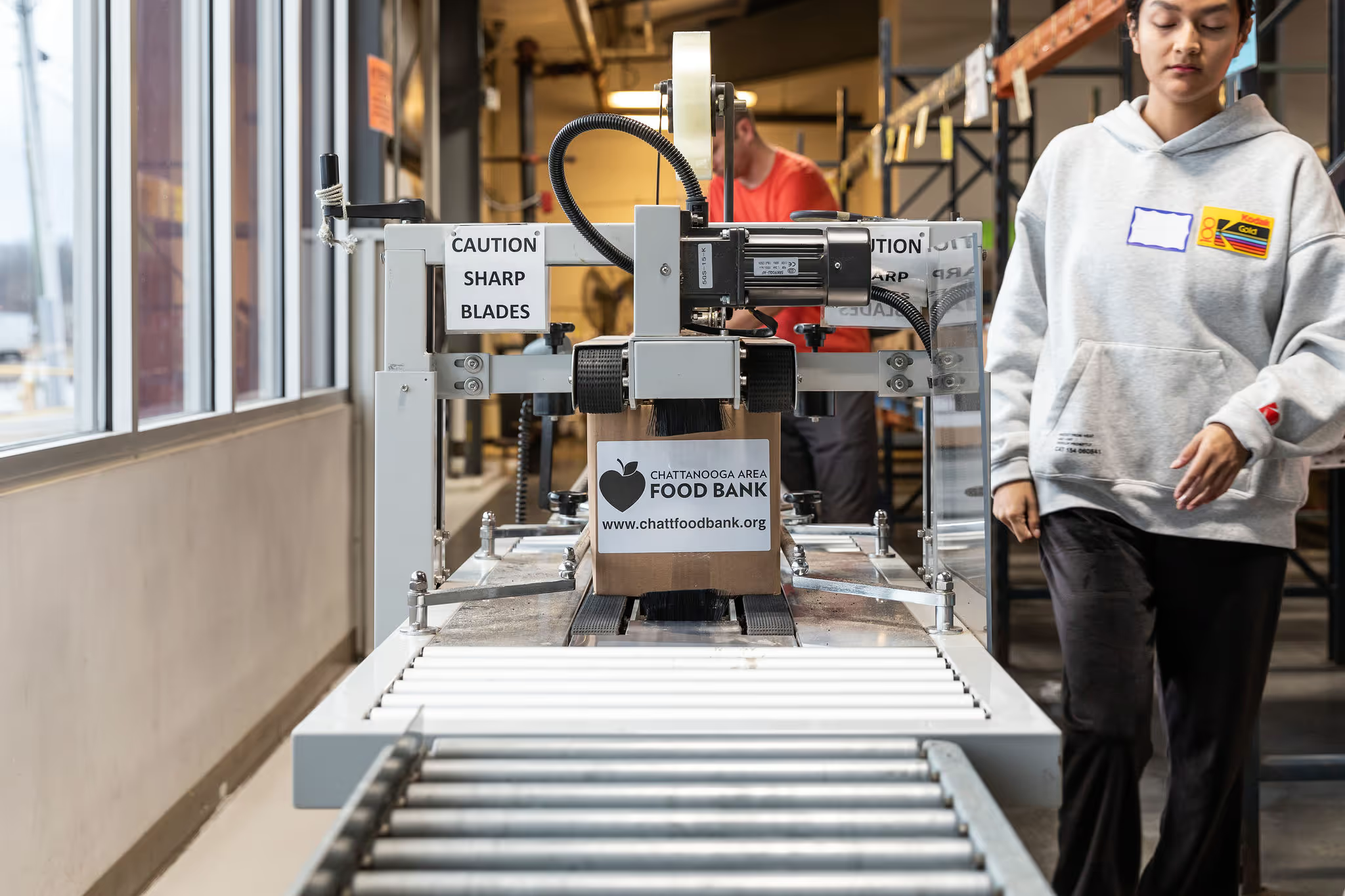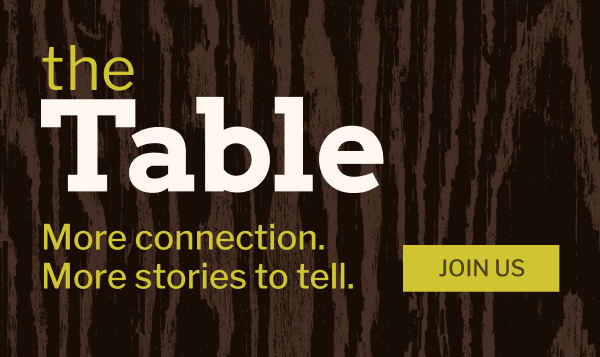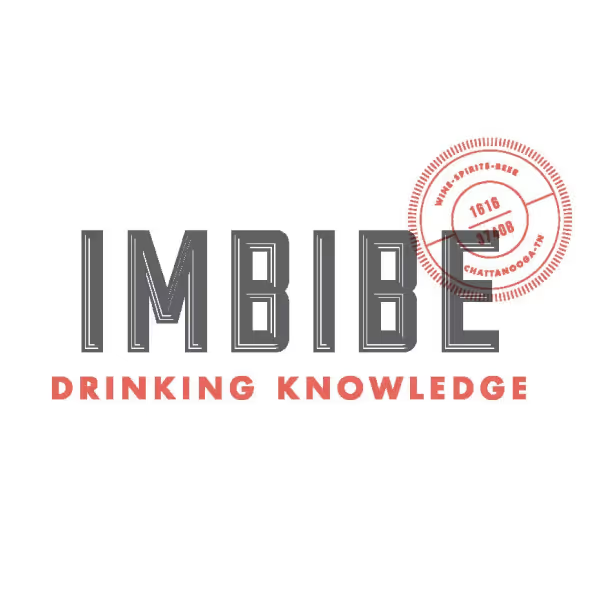
"This is Catastrophic" - Federal Cuts and the Chattanooga Area Food Bank
Some 20% of funding's been lost.
Food as a verb thanks
for sponsoring this series

At some point this spring, 13 transport trucks were scheduled for a delivery trip to the Chattanooga Area Food Bank.
Each truck would arrive full of food: cheese, milk, chicken, eggs, cranberries, pork chops.
Around the same time, dozens, if not 100s, of other trucks, also full of food, would journey towards other food banks and pantries across Tennessee, Georgia and the rest of the US.
The upcoming food deliveries were part of $500 million in USDA spending tied to the Commodity Credit Corporation, a US program created in 1933 to "stabilize, support and protect farm income and prices."
A small sample of record books and logs show the abundance of food contained within.



The trucks, however, will never arrive. The log books also show, in the right hand column, the reason:
"Canceled."
Those trucks - and the food they would contain - are no longer coming.
Recently, the decision was made: stop the trucks. Stop the program. The US government suspended approximately $500 million in CCC funding.
Locally, this resulted in some $400,000 in lost food. In the nine Georgia counties served by Chattanooga Area Food Bank (CAFB), an estimated $600,000 was lost in canceled food.
Food bank officials are stunned, but not for the first time.
"This is catastrophic," said Jeannine Carpenter, chief communications officer for CAFB.
"Eleven of those cancelled loads – just for our food bank – were full of proteins. Chicken, turkey, milk, eggs – these are items that our neighbors need and that are significantly more expensive for the food bank to source and purchase on our own, if these quantities could even be found for affordable purchase.”
It is just one of multiple funding losses over the last several weeks.
"The concerns are valid and the threats are real," CAFB's CEO Melissa Blevins said in a statement to supporters. "The Food Bank has already seen critical federal funding and nutrition programs paused, canceled, or erased.
"At the same time, many of our nonprofit partners are experiencing similar cuts, while food and housing costs for our neighbors remain persistently high."

In 2024, CAFB served 20 counties, providing nearly 17 million meals to our neighbors.

Funding comes from a variety of places, including nearly $10 million in combined government funding and grants.

Food banks rely on federal funding programs. When Chattanooga pantries and stomachs are full, it's often because of money that originates in Washington, like:
- The Emergency Food and Shelter Program.
These are federal funds - from $7,500 to $30,000 - that are received approximately every 10 months and help support CAFB's purchase of food for Hamilton County, TN.
Since the Trump administration took office in January, the program has been paused.
- The Local Food Purchase Assistance program (LFPA).
LFPA allowed food banks nationwide to purchase regionally-grown food from small farmers. Nearly every state participated.
Locally, LFPA accounted for nearly $1 million in funds going directly to small farmers.
The program has been canceled.
- The Emergency Food Assistance Program, or TEFAP.
TEFAP is funded from three sources, including CCC funding and those food delivery trucks, for example.
The CCC funding has been suspended.
Food bank officials expect some 20% of lost funding and while expecting an increase - initial, then growing larger - of hungry and vulnerable clients and families.
The catastrophe has the potential to grow worse.
The federal government has discussed reducing SNAP benefits.
"Without this critical public benefit, households eliminated from the program, all of which are living at or below the poverty level, will be exclusively dependent on food banks and food pantries to put food on their tables," said Carpenter.
The federal government has also discussed cutting free school meals program.
If eliminated, students at 568 schools in Tennessee and 501 schools in Georgia would no longer receive free meals, CAFB said.
"This is a critical source of nutrition for students and a relief for guardians and parents who rely on these programs to nourish their children. Without these meals, families will have increased food costs and increased nutrition assistance needs," Carpenter said.

The US government fired all Health and Human Services (HHS) employees responsible for helping low-income Americans afford heat and air-conditioning while also firing all HHS staff charged with helping states "protect people, including children, from neglect and abuse," according to The Hill.
It's also possible that Social Security benefits are delayed.
What's this got to do with food?
As one social net weakens, others will as well, but in accelerated and compounded ways.
Hungry people get hungrier. Desperation and instability compound.
Add in the possibility of tariff-caused price increases. Then, combine that with Tennessee's Gov. Bill Lee's decision to reduce summer food aid - reducing administrative costs, but serving fewer hungry children.
Those on the edges begin to fall all the way through.
More than a year ago - at the start of 2024 - food bank officials predicted hunger would reach an all-time high in the Chattanooga area.
"We will break all records," Blevins told us at the time.

Back then, no one imagined the way early 2025 would unfold, as needs, spurred by funding cuts, would escalate so quickly in such widespread ways.
Privately, food bank officials fear the worst is yet to come.
"It’s about people, not politics," said Blevins. "It’s about helping those who are struggling to make ends meet, those who have fallen on hard times, or those who are less fortunate.
"It’s about choosing kindness, valuing humanity first, and reminding ourselves that while we live in the richest country in the world, food insecurity is right here in our communities – for nearly 200,000 of our neighbors today."

Story ideas, questions, feedback? Interested in partnering with us? Email: david@foodasaverb.com
This story is 100% human generated; no AI chatbot was used in the creation of this content.
At some point this spring, 13 transport trucks were scheduled for a delivery trip to the Chattanooga Area Food Bank.
Each truck would arrive full of food: cheese, milk, chicken, eggs, cranberries, pork chops.
Around the same time, dozens, if not 100s, of other trucks, also full of food, would journey towards other food banks and pantries across Tennessee, Georgia and the rest of the US.
The upcoming food deliveries were part of $500 million in USDA spending tied to the Commodity Credit Corporation, a US program created in 1933 to "stabilize, support and protect farm income and prices."
A small sample of record books and logs show the abundance of food contained within.



The trucks, however, will never arrive. The log books also show, in the right hand column, the reason:
"Canceled."
Those trucks - and the food they would contain - are no longer coming.
Recently, the decision was made: stop the trucks. Stop the program. The US government suspended approximately $500 million in CCC funding.
Locally, this resulted in some $400,000 in lost food. In the nine Georgia counties served by Chattanooga Area Food Bank (CAFB), an estimated $600,000 was lost in canceled food.
Food bank officials are stunned, but not for the first time.
"This is catastrophic," said Jeannine Carpenter, chief communications officer for CAFB.
"Eleven of those cancelled loads – just for our food bank – were full of proteins. Chicken, turkey, milk, eggs – these are items that our neighbors need and that are significantly more expensive for the food bank to source and purchase on our own, if these quantities could even be found for affordable purchase.”
It is just one of multiple funding losses over the last several weeks.
"The concerns are valid and the threats are real," CAFB's CEO Melissa Blevins said in a statement to supporters. "The Food Bank has already seen critical federal funding and nutrition programs paused, canceled, or erased.
"At the same time, many of our nonprofit partners are experiencing similar cuts, while food and housing costs for our neighbors remain persistently high."

In 2024, CAFB served 20 counties, providing nearly 17 million meals to our neighbors.

Funding comes from a variety of places, including nearly $10 million in combined government funding and grants.

Food banks rely on federal funding programs. When Chattanooga pantries and stomachs are full, it's often because of money that originates in Washington, like:
- The Emergency Food and Shelter Program.
These are federal funds - from $7,500 to $30,000 - that are received approximately every 10 months and help support CAFB's purchase of food for Hamilton County, TN.
Since the Trump administration took office in January, the program has been paused.
- The Local Food Purchase Assistance program (LFPA).
LFPA allowed food banks nationwide to purchase regionally-grown food from small farmers. Nearly every state participated.
Locally, LFPA accounted for nearly $1 million in funds going directly to small farmers.
The program has been canceled.
- The Emergency Food Assistance Program, or TEFAP.
TEFAP is funded from three sources, including CCC funding and those food delivery trucks, for example.
The CCC funding has been suspended.
Food bank officials expect some 20% of lost funding and while expecting an increase - initial, then growing larger - of hungry and vulnerable clients and families.
The catastrophe has the potential to grow worse.
The federal government has discussed reducing SNAP benefits.
"Without this critical public benefit, households eliminated from the program, all of which are living at or below the poverty level, will be exclusively dependent on food banks and food pantries to put food on their tables," said Carpenter.
The federal government has also discussed cutting free school meals program.
If eliminated, students at 568 schools in Tennessee and 501 schools in Georgia would no longer receive free meals, CAFB said.
"This is a critical source of nutrition for students and a relief for guardians and parents who rely on these programs to nourish their children. Without these meals, families will have increased food costs and increased nutrition assistance needs," Carpenter said.

The US government fired all Health and Human Services (HHS) employees responsible for helping low-income Americans afford heat and air-conditioning while also firing all HHS staff charged with helping states "protect people, including children, from neglect and abuse," according to The Hill.
It's also possible that Social Security benefits are delayed.
What's this got to do with food?
As one social net weakens, others will as well, but in accelerated and compounded ways.
Hungry people get hungrier. Desperation and instability compound.
Add in the possibility of tariff-caused price increases. Then, combine that with Tennessee's Gov. Bill Lee's decision to reduce summer food aid - reducing administrative costs, but serving fewer hungry children.
Those on the edges begin to fall all the way through.
More than a year ago - at the start of 2024 - food bank officials predicted hunger would reach an all-time high in the Chattanooga area.
"We will break all records," Blevins told us at the time.

Back then, no one imagined the way early 2025 would unfold, as needs, spurred by funding cuts, would escalate so quickly in such widespread ways.
Privately, food bank officials fear the worst is yet to come.
"It’s about people, not politics," said Blevins. "It’s about helping those who are struggling to make ends meet, those who have fallen on hard times, or those who are less fortunate.
"It’s about choosing kindness, valuing humanity first, and reminding ourselves that while we live in the richest country in the world, food insecurity is right here in our communities – for nearly 200,000 of our neighbors today."

Story ideas, questions, feedback? Interested in partnering with us? Email: david@foodasaverb.com
This story is 100% human generated; no AI chatbot was used in the creation of this content.
















